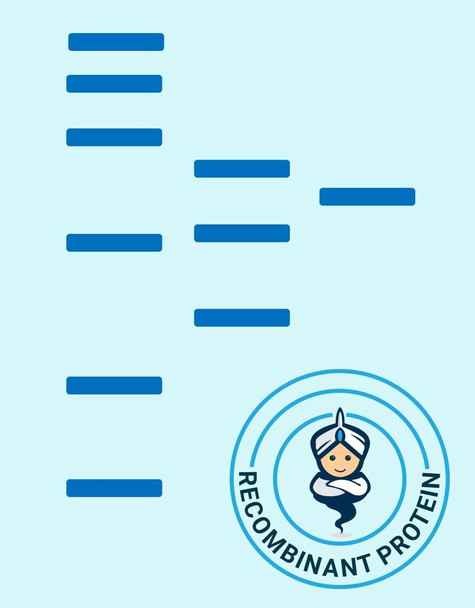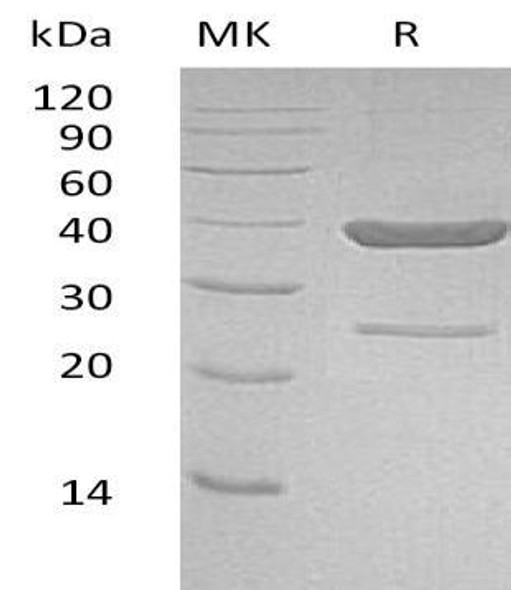Enzymes Recombinant Proteins
Human AKR1C4 Recombinant Protein (RPPB5796)
- SKU:
- RPPB5796
- Product Type:
- Recombinant Protein
- Species:
- Human
- Uniprot:
- P17516
- Research Area:
- Enzymes
Description
| Product Name: | Human AKR1C4 Recombinant Protein |
| Product Code: | RPPB5796 |
| Size: | 10µg |
| Species: | Human |
| Target: | AKR1C4 |
| Synonyms: | Aldo-keto reductase family 1 member C4 (chlordecone reductase 3-alpha hydroxysteroid dehydrogenase type I dihydrodiol dehydrogenase 4), 3-alpha-hydroxysteroid dehydrogenase type I, MGC22581, HAKRA, 3 alpha-hydroxysteroid dehydrogenase/dihydrodiol dehydrogenase 4, CDR, DD4, CHDR, 3-alpha-HSD1, C11. |
| Source: | Escherichia Coli |
| Physical Appearance: | Sterile Filtered colorless solution. |
| Formulation: | AKR1C4 protein solution (1mg/ml) containing �20mM Tris-HCl buffer (pH 8.5), 0.1M NaCl, 10% glycerol�and 1mM DTT. |
| Stability: | Store at 4°C if entire vial will be used within 2-4 weeks. Store, frozen at -20°C for longer periods of time. For long term storage it is recommended to add a carrier protein (0.1% HSA or BSA).Avoid multiple freeze-thaw cycles. |
| Purity: | Greater than 90.0% as determined by SDS-PAGE. |
| Amino Acid Sequence: | MDPKYQRVEL NDGHFMPVLG FGTYAPPEVP RNRAVEVTKL AIEAGFRHID SAYLYNNEEQ VGLAIRSKIA DGSVKREDIF YTSKLWCTFF QPQMVQPALE SSLKKLQLDY VDLYLLHFPM ALKPGETPLP KDENGKVIFD TVDLSATWEV MEKCKDAGLA KSIGVSNFNC RQLEMILNKP GLKYKPVCNQ VECHPYLNQS KLLDFCKSKD IVLVAHSALG TQRHKLWVDP NSPVLLEDPV LCALAKKHKR TPALIALRYQ LQRGVVVLAK SYNEQRIREN IQVFEFQLTS EDMKVLDGLN RNYRYVVMDF LMDHPDYPFS DEY |
| Biological Activity: | Specific activity is > 700pmol/min/ug, and is defined as the amount of enzyme that catalyze the oxidation of 1.0pmole 1-Acenaphthenol in the presence of NADP per minute at pH 8.8 at 25C |
Aldo-keto reductase family 1 member C4 �or AKR1C4 is a part of the aldo/keto reductase superfamily that has more then 40 known proteins & enzymes. AKR1C4 catalyzes the conversion of aldehydes and ketones to their corresponding alcohols with NADH and/or NADPH as cofactors. AKR1C4 takes place in the bioreduction of chlordecone, a toxic organochlorine pesticide, to chlordecone alcohol in the liver tissue.
AKR1C4 Human Recombinant produced in E.Coli is a single, non-glycosylated, polypeptide chain containing 323 amino acids (1-323aa ) and having a molecular mass of �37kDa.
| UniProt Protein Function: | AKR1C4: Catalyzes the transformation of the potent androgen dihydrotestosterone (DHT) into the less active form, 5-alpha- androstan-3-alpha,17-beta-diol (3-alpha-diol). Also has some 20- alpha-hydroxysteroid dehydrogenase activity. The biotransformation of the pesticide chlordecone (kepone) to its corresponding alcohol leads to increased biliary excretion of the pesticide and concomitant reduction of its neurotoxicity since bile is the major excretory route. Defects in AKR1C4 are a cause of 46,XY sex reversal type 8 (SRXY8). A disorder of sex development. Affected individuals have a 46,XY karyotype but present as phenotypically normal females. AKR1C4 mutations may act as modifier of disease severity in SRXY8 patients. A splicing mutation resulting in loss of exon 2 has been found in affected individuals also carrying mutation Val-79 in AKR1C2 (PubMed:21802064). Belongs to the aldo/keto reductase family. |
| UniProt Protein Details: | Protein type:Lipid Metabolism - androgen and estrogen; Oxidoreductase; Lipid Metabolism - C21-steroid hormone; Lipid Metabolism - primary bile acid biosynthesis; EC 1.1.1.357; Xenobiotic Metabolism - metabolism by cytochrome P450; EC 1.1.1.225 Chromosomal Location of Human Ortholog: 10p15.1 Cellular Component: cytoplasm; cytosol Molecular Function:oxidoreductase activity, acting on NADH or NADPH, quinone or similar compound as acceptor; electron carrier activity; aldo-keto reductase activity; chlordecone reductase activity; 3(or 17)-alpha-hydroxysteroid dehydrogenase activity; bile acid transmembrane transporter activity; retinal dehydrogenase activity Biological Process: steroid metabolic process; bile acid and bile salt transport; bile acid biosynthetic process; phototransduction, visible light; bile acid metabolic process; androgen metabolic process; retinoid metabolic process Disease: 46,xy Sex Reversal 8 |
| NCBI Summary: | This gene encodes a member of the aldo/keto reductase superfamily, which consists of more than 40 known enzymes and proteins. These enzymes catalyze the conversion of aldehydes and ketones to their corresponding alcohols by utilizing NADH and/or NADPH as cofactors. The enzymes display overlapping but distinct substrate specificity. This enzyme catalyzes the bioreduction of chlordecone, a toxic organochlorine pesticide, to chlordecone alcohol in liver. This gene shares high sequence identity with three other gene members and is clustered with those three genes at chromosome 10p15-p14. [provided by RefSeq, Jul 2008] |
| UniProt Code: | P17516 |
| NCBI GenInfo Identifier: | 308153631 |
| NCBI Gene ID: | 1109 |
| NCBI Accession: | P17516.3 |
| UniProt Related Accession: | P17516 |
| Molecular Weight: | |
| NCBI Full Name: | Aldo-keto reductase family 1 member C4 |
| NCBI Synonym Full Names: | aldo-keto reductase family 1 member C4 |
| NCBI Official Symbol: | AKR1C4�� |
| NCBI Official Synonym Symbols: | C11; CDR; DD4; CHDR; DD-4; HAKRA; 3-alpha-HSD�� |
| NCBI Protein Information: | aldo-keto reductase family 1 member C4 |
| UniProt Protein Name: | Aldo-keto reductase family 1 member C4 |
| UniProt Synonym Protein Names: | 3-alpha-HSD1; 3-alpha-hydroxysteroid dehydrogenase type I (EC:1.1.1.357); Chlordecone reductase (EC:1.1.1.225); CDR; Dihydrodiol dehydrogenase 4; DD-4; DD4; HAKRA |
| UniProt Gene Name: | AKR1C4�� |
| UniProt Entry Name: | AK1C4_HUMAN |






